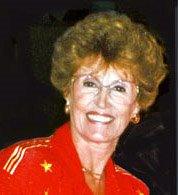
The Los Angeles County Fire Department's finest—Urban Search and Rescue, USAID-2—returned home last night to the county’s Tactical Support Facility in Pacoima, escorted by a helicopter and flashing lights from fire trucks.
As the buses pulled into the facility, my heart thudded in my chest. My son was on that bus and as a mother, my life was wrapped up in his safety. The team was greeted by hundreds of family members waving American flags and chanting USA-USA! As they stepped off the buses, they appeared to be in high spirits, but I was sure the glowing smiles belied the unimaginable sights and tragedies they’d experienced while in Haiti.
Television cameramen vied for spots to get the best shots. Children waved “Welcome Home” banners, balloons floated through the air as men embraced their families and some wept openly. I stood in line behind my daughter-in-law and three grandchildren to get my hugs. They were worth waiting for.
When we returned to my son’s home, he uploaded his videos and pictures of rescues that he’d taken during his two-week tour of duty. One particular scene broke my heart. It was filmed inside the hole where one poor woman had lain for four days; both hands held crushed and trapped by collapsed blocks of concrete and steel. We got to see, close up, the remarkable expertise of the rescuers as they brainstormed their way to save this woman; cutting, sawing, and prying their way to free her hands. It took over four hours of concentration, raw nerve, and perseverance to accomplish this one feat. I was griped with fear and awe as I watched them put their lives in danger. They crawled into the impossibly constricted hole to give the woman an IV, and then begin the delicate task of extracting her. When she was free, she began to sing a Haitian song, and the bystanders joined in with her. It was magic, my son said, and it made all the work worthwhile.
All together they pulled nine people from a sure death, with some rescues taking as long as twenty hours for just one survivor. Then came the heart-wrenching part…learning that a rescued girl later succumbed from her injuries.
To see those huge slabs of concrete they had to cut through made it clear why it took so long to get to the victims. Initially a structural engineer, a member of the team, had to check the integrity of the building before they could enter. Then, like diamond cutters, with precision and exactness, they had to work for hours just to remove one layer (one floor level at a time) of concrete and steel.
When the searching was called to a halt, the team now had time for humanitarian work, which my son said helped offset the pain and suffering they’d seen. They were told that an American AID worker, living in Haiti, had lost his wife and two children in a collapsed hotel. The team was able to find the deceased, and bring out his loved ones, which gave him the much needed closure to this horrible ordeal.
There were several instances where the team was called upon to do this; a Canadian who’d lost his daughter, and a Brazilian who lost his wife. Excavation equipment was brought in and the team was able to find the deceased; so the family was able to take their loved ones back to their homeland for a proper burial.
The team went about the devastation, delivering food and water where needed. They set up tents for medical teams that were operating out in the open air. They also donated several thousand dollars worth of tools and equipment to the destroyed Haitian Fire Department, who had lost almost everything in the earthquake.
My son sat with his children, that night, and told them about the poverty and ill health that the Haitians have to endure, and asked them to pray for the people of that country. He also told them how he saw children making kites from trash bags and sticks. When they got the kites in the air, they were smiling and laughing as they ran, surely forgetting for awhile, as only children can do, that they had no home to go to, and probably no dinner waiting for them.
After seeing all the poverty and devastation in my son’s videos and pictures, I thought how lucky we were to have been born in the U.S. But what if I’d been born in Haiti? By our accident of birth we have no right to feel superior to anyone, do we? Because, when you think about it, this could have happened to any of us? Our place of birth was determined by where our ancestors came from, where they were born, and so on down the line. Had our ancestors been slaves who wanted freedom and escaped to end it, we might have been pulling a plastic kite behind us. Maybe a silent prayer of thanks to our ancestors might be called for.
As my son tucked his precious girls into bed that night, we all said a prayer of thanks for his safe return.


